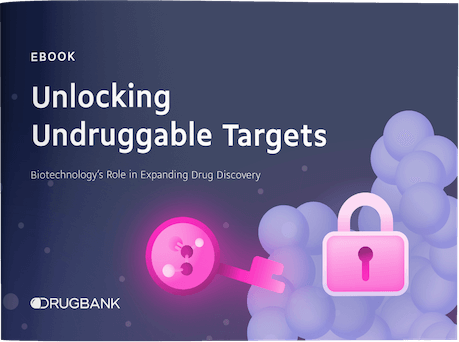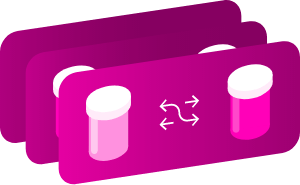Explore a selection of our essential drug information below, or:
Identification
- Summary
Vosoritide is an analogue of C-type naturietic peptide used to promote bone growth in pediatric patients with achondroplasia.
- Brand Names
- Voxzogo
- Generic Name
- Vosoritide
- DrugBank Accession Number
- DB11928
- Background
Achondroplasia is an autosomal dominant genetic disease and the most common cause of dwarfism in humans.2 It results from a gain-of-function missense mutation in FGFR3 that results in a dramatic suppression of bone growth, both in volume and in length.1,2 Treatment for achondroplasia includes both surgical and pharmacological interventions, the latter of which includes C-type natriuretic peptide (CNP) analogs.
Endogenous CNP, first described in 1998, is primarily responsible for the stimulation of chondrocytes and long bone growth via activity at the NPR-B receptor, making it an attractive target in the treatment of a condition like achondroplasia.1 While the remarkably short half-life of endogenous CNP - 2 to 3 minutes due to its rapid degradation by endopeptidases - makes it ineffective as a therapeutic intervention,1 the development of a peptidase-resistant formulation has allowed for its use as a viable treatment option in achondroplasia.
Vosoritide is an analog of CNP with proline-glycine on its N-terminus to convey resistance to neutral endopeptidase.3 It was approved for use under the brand name Voxzogo (BioMarin Pharmaceutical Inc.) in the EU in August 2021 and the US in November 2021,6,5 becoming the first pharmacological intervention approved for the treatment of achondroplasia in both regions.
- Type
- Biotech
- Groups
- Approved, Investigational
- Biologic Classification
- Protein Based Therapies
Peptides - Protein Chemical Formula
- C176H290N56O51S3
- Protein Average Weight
- 4100.0 Da
- Sequences
- Not Available
- Synonyms
- Vosoritide
- External IDs
- BMN 111
- BMN-111
Pharmacology
- Indication
Vosoritide is indicated for the promotion of linear growth in pediatric patients with achondroplasia who are 5 years of age and older with open epiphyses.3
This indication is approved under accelerated approval based on an improvement in annualized growth velocity. Continued approval for this indication may be contingent upon verification and description of clinical benefit in confirmatory trial(s).7
 Reduce drug development failure ratesBuild, train, & validate machine-learning modelswith evidence-based and structured datasets.Build, train, & validate predictive machine-learning models with structured datasets.
Reduce drug development failure ratesBuild, train, & validate machine-learning modelswith evidence-based and structured datasets.Build, train, & validate predictive machine-learning models with structured datasets.- Contraindications & Blackbox Warnings
 Prevent Adverse Drug Events TodayTap into our Clinical API for life-saving information on contraindications & blackbox warnings, population restrictions, harmful risks, & more.Avoid life-threatening adverse drug events with our Clinical API
Prevent Adverse Drug Events TodayTap into our Clinical API for life-saving information on contraindications & blackbox warnings, population restrictions, harmful risks, & more.Avoid life-threatening adverse drug events with our Clinical API- Pharmacodynamics
Vosoritide is an analog of C-type natriuretic peptide that promotes bone growth to combat growth suppression in children with achondroplasia. Urinary cyclic guanosine monophosphate (cGMP) and serum collagen type X marker (CXM) are both elevated following daily therapy with vosoritide and serve as biomarkers for evidence of increased endochondral bone growth, with cGMP indicative of NPR-B binding activity and CXM indicative of bone metabolism.3
Although relatively well-tolerated, transient episodes of hypotension have been observed in clinical studies. Patients with pre-existing cardiovascular disease and those taking antihypertensive medications were excluded from clinical trials. The risk of hypotension may be reduced by ensuring adequate food and fluid intake prior to the administration of vosoritide.3 The use of vosoritide in patients with an eGFR <60 mL/min/1.73m2 should also be avoided as there are no data on the influence of renal impairment on its pharmacokinetics.3
- Mechanism of action
Achondroplasia is a congenital disease resulting from a missense mutation in the fibroblast growth factor receptor 3 (FGFR3) gene,1 resulting in a gain-of-function that negatively regulates endochondral bone growth.3 Under normal conditions, FGFR3 is expressed during both embryonic and postnatal development, but serves a different role in each. During initial development, FGFR3 signaling promotes proliferation of chondrocytes (i.e. growth), whereas postnatal skeletal growth is actually inhibited by FGFR3 - as a result, the pathologic activation of FGFR3 observed in patients with achondroplasia leads to suppressed pre-pubertal skeletal growth.2
Vosoritide is an analog of C-type natriuretic peptide (CNP),3 a signaling molecule that appears primarily responsible for the stimulation of chondrocytes and the growth of long bones.1 The binding of CNP (or vosoritide) with its corresponding receptor, NPR-B, results in a signaling cascade that ultimately inhibits the MAPK/ERK pathway via inhibition of RAF-1 and stimulates the proliferation and differentiation of chondrocytes. This activity serves to antagonize the downstream signaling resulting from FGFR3 and its resultant effects on bone growth.3,1
Target Actions Organism AAtrial natriuretic peptide receptor 2 agonistHumans - Absorption
In patients receiving daily subcutaneous injections of vosoritide 15 mcg/kg, the mean Cmax ranged from 4.71-7.18 ng/mL and the mean AUC0-t ranged from 161-290 ng-min/mL.3 The median Tmax following subcutaneous injection was approximately 15 minutes.3
- Volume of distribution
The mean apparent volume of distribution following the subcutaneous administration of 15 mcg/kg of vosoritide ranged from 2880 to 3020 mL/kg.3
- Protein binding
Not Available
- Metabolism
As with other therapeutic proteins, vosoritide is likely metabolized via catabolic pathways into smaller peptides and amino acids.3
- Route of elimination
Not Available
- Half-life
The mean half-life following the subcutaneous administration of 15 mcg/kg of vosoritide ranged from 21.0 to 27.9 minutes.3
- Clearance
The mean apparent clearance following the subcutaneous administration of 15 mcg/kg of vosoritide ranged from 79.4 to 104 mL/min/kg.3
- Adverse Effects
 Improve decision support & research outcomesWith structured adverse effects data, including: blackbox warnings, adverse reactions, warning & precautions, & incidence rates. View sample adverse effects data in our new Data Library!Improve decision support & research outcomes with our structured adverse effects data.
Improve decision support & research outcomesWith structured adverse effects data, including: blackbox warnings, adverse reactions, warning & precautions, & incidence rates. View sample adverse effects data in our new Data Library!Improve decision support & research outcomes with our structured adverse effects data.- Toxicity
Doses of two- to three-fold the recommended daily dose of 15 mcg/kg were administered to patients in clinical trials with no evidence of associated adverse reactions.4 If an overdose is suspected, implement supportive measures as clinically indicated.
- Pathways
- Not Available
- Pharmacogenomic Effects/ADRs
- Not Available
Interactions
- Drug Interactions
- This information should not be interpreted without the help of a healthcare provider. If you believe you are experiencing an interaction, contact a healthcare provider immediately. The absence of an interaction does not necessarily mean no interactions exist.Not Available
- Food Interactions
- Drink plenty of fluids. To reduce the risk of hypotension, patients should drink 240-300 mL of fluid in the hour prior to administration.
- Take with food. To reduce the risk of hypotension, patients should ensure adequate food intake prior to vosoritide injection.
Products
 Drug product information from 10+ global regionsOur datasets provide approved product information including:dosage, form, labeller, route of administration, and marketing period.Access drug product information from over 10 global regions.
Drug product information from 10+ global regionsOur datasets provide approved product information including:dosage, form, labeller, route of administration, and marketing period.Access drug product information from over 10 global regions.- Brand Name Prescription Products
Name Dosage Strength Route Labeller Marketing Start Marketing End Region Image Voxzogo Injection, powder, for solution 0.4 mg Subcutaneous Biomarin International Limited 2021-10-06 Not applicable EU Voxzogo Injection, powder, for solution 1.2 mg Subcutaneous Biomarin International Limited 2021-10-06 Not applicable EU Voxzogo Injection, powder, for solution 0.56 mg Subcutaneous Biomarin International Limited 2021-10-06 Not applicable EU VOXZOGO 0.4mg Injection, powder, lyophilized, for solution; Kit 0.4 mg/0.5mL Subcutaneous BioMarin Pharmaceutical Inc. 2021-11-19 Not applicable US VOXZOGO 0.56mg Injection, powder, lyophilized, for solution; Kit 0.56 mg/0.7mL Subcutaneous BioMarin Pharmaceutical Inc. 2021-11-19 Not applicable US
Categories
- ATC Codes
- M05BX07 — Vosoritide
- Drug Categories
- Chemical TaxonomyProvided by Classyfire
- Description
- Not Available
- Kingdom
- Organic Compounds
- Super Class
- Organic Acids
- Class
- Carboxylic Acids and Derivatives
- Sub Class
- Amino Acids, Peptides, and Analogues
- Direct Parent
- Peptides
- Alternative Parents
- Not Available
- Substituents
- Not Available
- Molecular Framework
- Not Available
- External Descriptors
- Not Available
- Affected organisms
- Humans and other mammals
Chemical Identifiers
- UNII
- 7SE5582Q2P
- CAS number
- 1480724-61-5
References
- General References
- Wrobel W, Pach E, Ben-Skowronek I: Advantages and Disadvantages of Different Treatment Methods in Achondroplasia: A Review. Int J Mol Sci. 2021 May 25;22(11). pii: ijms22115573. doi: 10.3390/ijms22115573. [Article]
- Ornitz DM, Legeai-Mallet L: Achondroplasia: Development, pathogenesis, and therapy. Dev Dyn. 2017 Apr;246(4):291-309. doi: 10.1002/dvdy.24479. Epub 2017 Mar 2. [Article]
- FDA Approved Drug Products: Voxzogo (vosoritide) injection for subcutaneous use [Link]
- EMA Summary of Product Characteristics: Voxzogo (vosoritide) for subcutaneous injection [Link]
- FDA News Release: FDA Approves First Drug to Improve Growth in Children with Most Common Form of Dwarfism [Link]
- EMA European Public Assessment Report: Voxzogo (vosoritide) [Link]
- FDA approved drug product: VOXZOGO (vosoritide) for injection, for subcutaneous use (October 2023) [Link]
- External Links
- PubChem Substance
- 347911258
- 2586354
- Wikipedia
- Vosoritide
Clinical Trials
- Clinical Trials
Clinical Trial & Rare Diseases Add-on Data Package
Explore 4,000+ rare diseases, orphan drugs & condition pairs, clinical trial why stopped data, & more. Preview package Phase Status Purpose Conditions Count Start Date Why Stopped 100+ additional columns Unlock 175K+ rows when you subscribe.View sample data3 Active Not Recruiting Treatment Achondroplasia 1 somestatus stop reason just information to hide 3 Completed Treatment Achondroplasia 1 somestatus stop reason just information to hide 3 Enrolling by Invitation Treatment Hypochondroplasia 1 somestatus stop reason just information to hide 2 Active Not Recruiting Treatment Achondroplasia 3 somestatus stop reason just information to hide 2 Active Not Recruiting Treatment Short Stature 1 somestatus stop reason just information to hide
Pharmacoeconomics
- Manufacturers
- Not Available
- Packagers
- Not Available
- Dosage Forms
Form Route Strength Injection, powder, for solution Subcutaneous 0.4 mg Injection, powder, for solution Subcutaneous 0.56 mg Injection, powder, for solution Subcutaneous 1.2 mg Injection, powder, lyophilized, for solution; kit Subcutaneous 0.4 mg/0.5mL Injection, powder, lyophilized, for solution; kit Subcutaneous 0.56 mg/0.7mL Injection, powder, lyophilized, for solution; kit Subcutaneous 1.2 mg/0.6mL - Prices
- Not Available
- Patents
Patent Number Pediatric Extension Approved Expires (estimated) Region USRE48267 No 2020-10-20 2030-05-20 US US8198242 No 2012-06-12 2030-06-11 US US10646550 No 2020-05-12 2036-08-01 US US9907834 No 2018-03-06 2036-08-01 US US11911446 No 2016-08-01 2036-08-01 US US11590204 No 2016-08-01 2036-08-01 US
Properties
- State
- Solid
- Experimental Properties
- Not Available
Targets

- Kind
- Protein
- Organism
- Humans
- Pharmacological action
- Yes
- Actions
- Agonist
- General Function
- Receptor for the C-type natriuretic peptide NPPC/CNP hormone. Has guanylate cyclase activity upon binding of its ligand. May play a role in the regulation of skeletal growth
- Specific Function
- adenylate cyclase activity
- Gene Name
- NPR2
- Uniprot ID
- P20594
- Uniprot Name
- Atrial natriuretic peptide receptor 2
- Molecular Weight
- 117020.97 Da
References
- FDA Approved Drug Products: Voxzogo (vosoritide) injection for subcutaneous use [Link]
Drug created at October 20, 2016 21:01 / Updated at October 24, 2023 01:30

